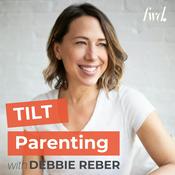Today we’re exploring something so many of us wrestle with but don’t
always name out loud — the impact of our own fear and anxiety on our
kids. I was actually about to record a solo episode when my friend and
colleague Sheryl Stoller sent me an email, and the sentiment behind it
stayed with me because it put into such simple, clear language the real
impact our fears about their future, their potential, their lives, can
have on our kids. In this short bite-sized conversation, we’ll talk
about how parental anxiety shapes family dynamics, why regulating our
own nervous systems is such a powerful gift we can offer our kids, and
how empathy, validation, and community support can help us move from
fear toward connection.
About Sheryl
Sheryl Stoller is a PCI Certified Parent Coach® who has devoted
herself to coaching overwrought parents of children whose abilities,
sensibilities, and behaviors go beyond expectations (gifted,
twice/multi-exceptional) since 2009. This is a personal journey as well
as an academic and professional one for Sheryl. She is deeply gratified
to serve parents the way she had needed when her children were young.
Sheryl integrates many fields of knowledge and training into her
coaching. Most recently, she is receiving her Somatic Attachment Therapy
Certification; and is a Positive Intelligence (PI) Mental Fitness
Coach, through Shirzad Chamine out of Stanford University. Sheryl
Co-Leads two communities of practice for PI – Parents and Families, and
Neurodiversity; and has received rave reviews for her customization of
PI for her “Aligned Parents” and “Get Mental and Emotional Fitness”
Group programs for 2E parents. Connect with Sheryl at:
[email protected] Things you’ll learn from this episode:
How fear in parents can show up as anxiety — and how children often absorb and mirror that energy
Why managing our own fears is one of the most powerful ways we can support our kids
How empathy and validation create safety even when anxiety is present
Why remembering that everything is impermanent can help parents regain perspective
How focusing on past successes builds a child’s confidence and counters fear-based narratives
Why community, positive imagination, and ongoing learning remind parents they’re not alone in this journey
Learn more about your ad choices. Visit podcastchoices.com/adchoices



